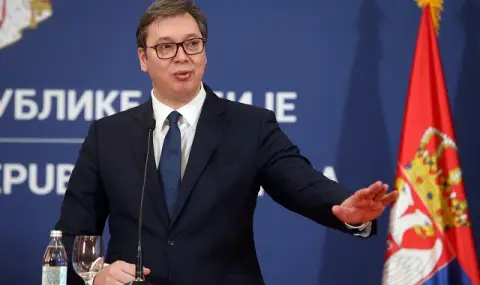Serbian President Aleksandar Vucic said last night at a reception for UN ambassadors that Serbia always was committed to the UN Charter. He called for the withdrawal of the draft resolution to declare an international day to commemorate the genocide in Srebrenica, because it “does not lead to reconciliation, but to destabilization of the region”, Serbian national TV RTS reported, quoted by BTA.
„Serbia has always been committed to the UN Charter and the resolutions to it - I believe that these are the main principles of the world from the future, Vucic pointed out and added that the role of the UN in the world should be greater. “This is the only way to restore peace and stability to the world. We have always been sincere – whoever violates the international order, we recognize it and we are on the side of the victims.
Vucic organized a reception last night in New York for the permanent representatives to the UN on the occasion of the proposed resolution on Srebrenica, which should be discussed at the beginning of May.
In April, a draft resolution was presented to the UN for a “Day in memory of the genocide committed in Srebrenica in 1995” The proposal is for July 11 to be marked around the world as the International Day of Remembrance of the Genocide in Srebrenica. The resolution was supported by the representatives of the Croats and Bosniaks in the three-member Presidency of Bosnia and Herzegovina, but not by the representative of the Serbs. The UN General Assembly must vote on the resolution in a plenary session on May 2.
„There have been no discussions in Bosnia and Herzegovina about this draft resolution, which imposes a deep division of ethnic communities. Contrary to all expectations, this resolution was proposed, although it was not adopted by consensus and was aimed at one of the (state-forming) peoples (in Bosnia)”, noted the Serbian president, adding that the resolution aims to blame only one people, which will led to mistrust and destabilization in Bosnia. “We hope that this is not the desire of the proponents of the resolution, because it will not heal the wounds of the past, but will only deepen them.
On July 11, 1995, the Muslim enclave of Srebrenica was captured by Bosnian Serb forces under the command of Gen. Ratko Mladic during the war in Bosnia and Herzegovina (1992-1995). Bosnian Serbs slaughter 8,000 Muslims – men and boys in the enclave, declared a UN safe zone. The mass slaughter, declared on February 26, 2007 by the International Court in The Hague as genocide, is the worst bloodshed in Europe since the Second World War (1939-1945).
Russia's ambassador to the United Nations, Vasily Nebenzia, described the resolution as “opening Pandora's box”.
„If this resolution is passed, it will pave the way for other countries that have similar problems to come forward with their problems. (…) Germany, which is behind this resolution, although it is not the original importer, is responsible for the biggest and cruelest genocide in the 20th century, and here I mean the Second World War,“, Nebenzia emphasized, quoted by Tanyug.< /p>
He added that the resolution on Srebrenica was “a cunning attempt” to make a highly politicized decision that will not help peace in the Balkans, especially in Bosnia, especially because the decision will not be made according to the country's constitution.
After the 1992-1995 inter-ethnic war in Bosnia and Herzegovina, according to the terms of the Dayton Peace Agreement, the country was divided into two semi-autonomous parts - the Republika Srpska, inhabited mainly by Bosnian Serbs, and the Muslim-Croat Federation of Bosnia and Herzegovina, where Bosnians live Muslims (Bosniaks) and Bosnian Croats. Republika Srpska does not support the draft resolution on the genocide in Srebrenica, and the president of the constituent part, Milorad Dodik, has even threatened to declare independence if the resolution is passed.
